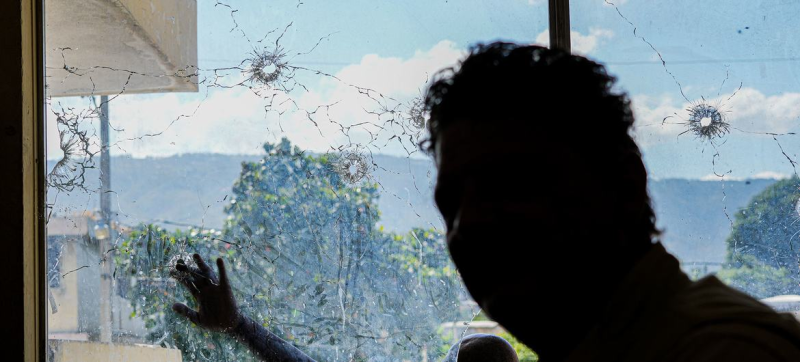- Body of Osman Hadi Returns to Dhaka From Singapore Late |
- Fakhrul condemns attacks on media, calls for unity, justice |
- 2 cops among 4 hurt in clash outside Indian Assit H.C. in Ctg |
- Inqilab Moncho urges people to avoid violence |
- Hadi’s death: Prothom Alo, Daily Star offices set afire |
Haiti’s Spiral into ‘Wild West’ as Gangs and Vigilantes Rise

A UN staff member tours a building targeted by gangs in Port-au-Prince.
With armed gangs expanding their influence, self-defence groups morphing into gang-like entities, and public officials acting with impunity, Haiti is slowly becoming something like the Wild West, according to William O’Neill, the UN’s designated expert on human rights for the Caribbean nation.
If you ask Mr. O’Neill what is creating these Wild West conditions, the answer is desperation. With over 1.3 million Haitians displaced and half the country going hungry, desperation in Haiti is not an abstract idea — it is a lived reality.
Nevertheless, he remains hopeful that Haiti’s devastation can be stopped — if the world commits to it.
Mr. O’Neill said he has never met a gang leader but has spoken to young boys arrested for gang involvement. One 12-year-old street child, abandoned by his family, was recruited as a lookout in exchange for food and small payments. Many share similar stories of deep poverty, lack of options, and absence of hope.
“It’s hell on earth,” he said, describing the situation as a criminal mafia preying on the population. Violence has severely compromised economic, social, and cultural rights, alongside basic rights to life, food, healthcare, clean water, shelter, and education.
One glaring case involves the public prosecutor in Miragoâne, accused of killing more than 80 people with total impunity. Surprisingly, he is popular among locals for “standing up” to gangs, a reflection of failed institutions.
While some self-defence groups are initially welcomed, others act like gangs — demanding money, using violence, and even killing strangers on sight.
The government’s increasing use of “kamikaze drones” to target gang leaders raises human rights concerns. Haiti is not technically in armed conflict, and police are only allowed to use deadly force under limited circumstances, Mr. O’Neill warned.
Despite the chaos, Mr. O’Neill believes Haiti is not a lost cause. He cited three Security Council priorities: a well-equipped multinational force, sanctions, and halting weapons smuggling from the US. If done robustly, these could quickly weaken gangs, as they are widely despised by the population.

